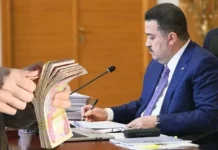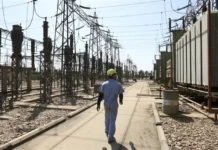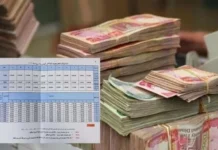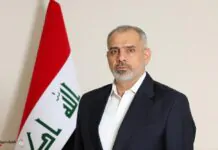Tishwash: Transforming Iraq into a regional hub: Establishing a “Global Gold City” in Baghdad
The Iraqi Ministry of Trade has announced the establishment of a dedicated city for the gold and jewelry industry in the Iraqi capital, Baghdad.
The aim is to localize the precious metal industry and boost local production within the country, “which will contribute to transforming Baghdad into a regional center for the gold industry and trade.”
The ministry announced in a statement on Wednesday, July 23, 2025, that the Ministerial Council for the Economy had approved the proposal submitted by the Ministry of Trade to establish a “Global Gold City” in Baghdad. The ministry described the move as “strategic, aiming to localize the gold and jewelry industry within Iraq and boost local production.”
Minister of Commerce, Athir Dawood Al-Ghurairi, emphasized in this regard that “the project represents a qualitative leap in the development of national industries,” noting that “the city will include an integrated system that includes specialized industrial units, advanced training centers for goldsmithing according to international standards, as well as advanced markets and an exchange for gold and jewelry.”
For his part, Director General of the Department of Foreign Economic Relations, Riyadh Fakher Al-Hashemi, explained that “the project aims to support the private sector and expand its contribution to the national economy,” noting that “the city will be established within the integrated economic city in Baghdad, contributing to transforming the capital into a regional center for the gold industry and trade.”
According to Al-Hashemi, the ministry has begun coordinating with the National Investment Commission to complete the requirements for land allocation and issue investment licenses in preparation for the project’s implementation. link
************
Tishwash: International certification in the reform notebook: The International Monetary Fund commends Iraq’s efforts to curb inflation.
In a move that may reflect a tangible shift in Iraq’s economic policy, the country received official praise from the International Monetary Fund for its efforts to curb inflation.
Economists consider this a positive indicator of the effectiveness of the policies adopted by the government and the Central Bank over the past period.
Economic expert Nasser Al-Tamimi told Baghdad Today on Tuesday (July 22, 2025) that “the IMF’s praise represents a reassuring message to the international community and investors, and reflects the seriousness of the economic policies that Baghdad has recently adopted.” He added that “Iraq has faced major inflationary challenges in recent years as a result of internal and external factors, including fluctuations in oil prices and disruptions in supply chains, in addition to political and financial pressures.”
Al-Tamimi pointed out that “the improvement in inflation indicators is the result of balanced monetary policies, including tightening monetary policy tools, enhancing market oversight, and maintaining the stability of the dinar exchange rate, which helped prevent price increases and protect citizens’ purchasing power.”
However, he stressed at the same time that this praise “is not the end of the road, but rather the beginning of a long reform journey,” emphasizing “the need to continue addressing structural gaps in the economy, expanding the revenue base beyond oil, and monitoring global developments that may impact price levels in the country in the future.”
Al-Tamimi concluded his statement by saying, “The IMF report provides a strong impetus to the economic reform process, while simultaneously placing an additional responsibility on decision-makers to continue the corrective approach and achieve comprehensive and sustainable development that serves citizens first and foremost.”
Economists believe that the Iraqi economy has faced significant inflationary challenges in recent years, influenced by a number of factors, most notably fluctuations in global oil prices, which represent the state’s primary source of revenue. In addition, internal political and security crises and disruptions to global supply chains, particularly following the COVID-19 pandemic and the war in Ukraine, have also contributed to this.
In 2021 and 2022, Iraq recorded relatively high inflation rates, which negatively impacted the prices of goods and services and affected the purchasing power of citizens, particularly those with limited income.
In response, the Central Bank of Iraq adopted a more restrictive monetary policy, raising interest rates, strengthening oversight of banking activity, and attempting to stabilize the dinar’s exchange rate against the dollar despite market volatility. link
************
Tishwash: The Parliamentary Finance Committee announces good news for employees and important information about the agreement with the region.
The Parliamentary Finance Committee revealed a government plan to issue bonuses and promotions without linking them to budget schedules.
Committee member Moeen Al-Kadhimi said during his appearance on the “Free Talk” program on Al-Furat satellite channel: “It is likely that in the coming period, Prime Minister Mohammed Shia Al-Sudani will instruct the Ministry of Finance to release bonuses and promotions for employees and not link them to budget schedules.”
He added, “After hosting Finance Minister Taif Sami, the discussion focused on the reasons for the delay in the budget schedules, the liquidity shortage, and employee salaries, bonuses, and promotions,” noting that “she emphasized covering basic needs through oil and non-oil revenues.”
Al-Kadhimi noted that “the current oil price of $65 a barrel is sufficient to cover monthly salaries, given continued exports and budget allocations.” He added that “each of the three-year budgets, estimated at 150 trillion dinars annually, can cover salaries and stalled projects without the need to create new ones.”
Regarding non-oil revenues, he explained that “their percentage does not exceed 12% currently,” calling for “a gradual plan to raise the percentage to 50% by strengthening collection, taxes, and border crossings with support from political blocs and the government.”
Regarding the region’s affairs, Al-Kadhimi asserted that “oil and non-oil revenues in Kurdistan amount to 9 trillion dinars annually, but the federal government is not receiving the actual figures and the region is refusing to pay.” He added that “the government, out of appreciation for the employees’ circumstances, has released a one-month salary allowance despite the region’s shortcomings.”
He pointed out that “Baghdad paid 700 billion dinars in salaries to the region for the month of June, compared to only 120 trillion dinars paid by the region as an initial attempt to resolve the crisis,” adding that “the crisis of trust and credibility was the main reason for the previous funding obstruction.”
Regarding the Ceyhan oil pipeline, Al-Kadhimi stated that “Turkey has presented new conditions related to compensation, doubling transit costs, and participation in gas projects and Kurdistan fields.” He emphasized “the need for the Iraqi government to move to negotiate during the current year, especially since Iraq possesses strong leverage.”
He called for “opening alternative export routes via the Red Sea, Syria, Jordan, and Saudi Arabia as emergency options,” stressing his “rejection of a Turkish incursion into Iraqi territory, given that the Kurdistan Workers’ Party (PKK) no longer exists.” He also warned against “continued violations of sovereignty and the arrival of Turkish forces on the outskirts of Mosul.”
Al-Kadhimi concluded by stressing “the importance of leveraging the economic card, particularly the water issue, to pressure Ankara and put an end to its security interventions within Iraqi territory.” link





